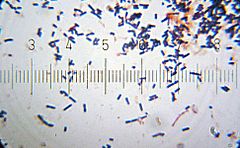 About Lactobacillus acidophilus
About Lactobacillus acidophilus
L acidophilus ferments sugars into lactic acid and is naturally present in the gastrointestinal tract, mouth, and vagina.
Possible Benefits
L. acidophilus creates acidic conditions in the vagina which helps to control yeast infections. One study found that a blend of probiotic strains containing L. acidophilus decreased the incidence of pediatric diarrhea. L. acidophilus led to a significant decrease in levels of toxic amines in the blood of dialysis patients with small bowel bacterial overgrowth. At adequate daily feeding levels, L. acidophilus may facilitate lactose digestion in lactose-intolerant subjects. [Source 1]
A University of Nebraska study found that feed supplemented with L. acidophilus and fed to cattle resulted in a 61% reduction of Escherichia coli 0157:H7. Research has indicated L. acidophilus may be helpful reducing serum cholesterol levels. [Source 2]
Sources:
1: Sanders ME, Klaenhammer TR (2001). “Invited review: the scientific basis of Lactobacillus acidophilus NCFM functionality as a probiotic”. J Dairy Sci 84 (2): 319–331. doi:10.3168/jds.S0022-0302(01)74481-5. PMID 11233016.
2: Anderson J, Gilliland S (1999). “Effect of fermented milk (yogurt) containing Lactobacillus acidophilus L1 on serum cholesterol in hypercholesterolemic humans”. J Am Coll Nutr 18 (1): 43–50. PMID 10067658.


Leave a Reply
Privacy Policy: ProbioticsDB.com only uses your information to respond to any questions you may have. We will not contact you for any other purposes and will not sell, distribute, or disseminate your information.